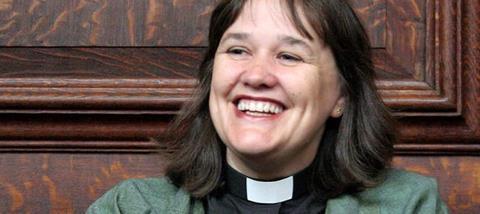
Following the appointment of the first female Bishop in the Church of England, Rev Libby Lane, a group within the Anglican Church has said it is time that gender inclusive language is used in reference to God. ‘Using both male and female language would get rid of the notion that God is some kind of old man in the sky’, said the Rev Percy, who is chaplain of Trinity College Oxford and a member of Women and the Church of England (Watch).
There have been a number of less-than-positive reactions to this call for moving away from solely referring to God as ‘he’ and beginning to use ‘more expansive language and imagery about God’.
We asked Rev Percy to respond to four theological critiques that have been put forward against her argument…
1. The Bible records that God revealed himself to mankind in male form. God communicates about himself as male in Genesis 1:27. ‘Dadashton’ commented on theguardian.com: ‘Let's ignore how God communicates Himself. Why bother with what He calls Himself? …you're fooling around with the truth to fit a human agenda.’
Emma Percy says: The Old Testament talks about God by using lots of metaphors. When God appears to individuals we see fire, cloud, glory and even a still small voice. The Israelites were keen to record that their God ‘I am’, Yahweh, was very different to the local idols and fertility goddesses. They are very careful to constantly point to the otherness of God and the sheer majesty and uncontainable nature of the Creator.
Yet, the people of Israel also wanted to express that God was in relationship with them, speaking to them, fighting battles for them, showing them mercy and making a covenant with them. To describe a meaningful relationship, language is needed to convey the personal nature and it is not surprising that the pronoun he is therefore used for God. In a world in which power, authority, inheritance, order and leadership was male this then becomes the most appropriate language to use for the all powerful Yahweh of Israel.
2. Scripture contains around 170 references to God as ‘Father’, and in order to be a father you need to be male. As Ann Widdicombe wrote in The Mail: ‘God clearly isn’t a She as a She can’t be a father. This is plain silly, unbiblical and ridiculous. I think it’s the work of a few lunatics.’
Emma Percy says: The concept of God as Father in the Bible, particularly in relation to Jesus, is important not for its masculinity in the human sense. God did not father Jesus as a human man fathers a child. In fact Jesus, born of a virgin, appears to have been created out of female flesh.
The Father/Son relationship is important for its sense of family inheritance. The male line is where name and property are passed down and the concept of Christ as his Father’s heir and our adoption as co-heirs, is a central theme in Pauline theology. Paul argues that in Christ, women and slaves can also become heirs, challenging the underlying cultural assumptions.
Religious truths are often paradoxical. Jesus is fully divine and human; men and women are made fully in the image of God. God is a father who can birth us anew. As Gregory of Nyssa (335-394) wrote: ‘Now no one who has given thought to the way we talk about God is going to be over precise about the sense of the name-that "mother" is mentioned instead of "father;" for he will gather the same meaning from either term. For the Divine is neither male nor female.’
3. This use of different language to refer to God is not something that could impact sexism either inside or outside the Church. ‘How is changing 'he' for 'she' going to combat sexism? Replacing 'he' for 'she' is simply reversing a perceived power structure, not combatting it’, wrote Matthew Davine on theguardian.com.
Emma Percy says: The fact that exclusively male language has been used about God has had profound impact on the way women are viewed in the Church and in wider culture. Patriarchy is founded on the concept that the male is the normative kind of human, and women are the ‘other’. If there is something essentially masculine about God it is then argued that the male experience of being human offers us a better experience, representation and understanding of the divine. This has been, and continues to be, used to argue against women’s ordination, women’s preaching and women’s leadership in many parts of the Church.
Maintaining a belief that a woman cannot represent Christ at the altar or speak authoritatively God’s word from the pulpit rests on the belief that male humanity is at some level more representative of the divine than female. If men and women are equally made in the image of God, then women’s human experience needs to be taken seriously as a spiritual resource for men and women.
4. To ask this question is to miss the point. Rev Kate Bottley commented in The Guardian: ‘We cannot describe the indescribable and for me that’s what it’s like when we try to use human language to describe God.’
Kate is of course right. All our language about God is partial, which is why we need a rich and varied way of talking about and to God. If we want to communicate our faith to others, if we want to deepen our own understanding of God and if we want to help others broaden their spirituality then we do have to find language to talk about who God is, and how we can come to know and be known by him.
Sometimes the language that makes us uncomfortable can help to challenge the ways in which we have contained God. To sing ‘The Lord’s my shepherd I’ll not want, she makes me down to lie’ or to pray a prayer, like the one below, is to think afresh about the rich and wonderful compassion of the God who is Creator, Redeemer and Sustainer of us all.
Marvellous Mother, you have carried us since you birthed creation
And continually watch over our growing.
However heavy we become,
You never relinquish your load.
Though you weep when we wander,
You will not lock the door on our return,
Stay always close, we pray, through the love of your Son, Jesus Christ.
Amen
(Judith Diamond)





























